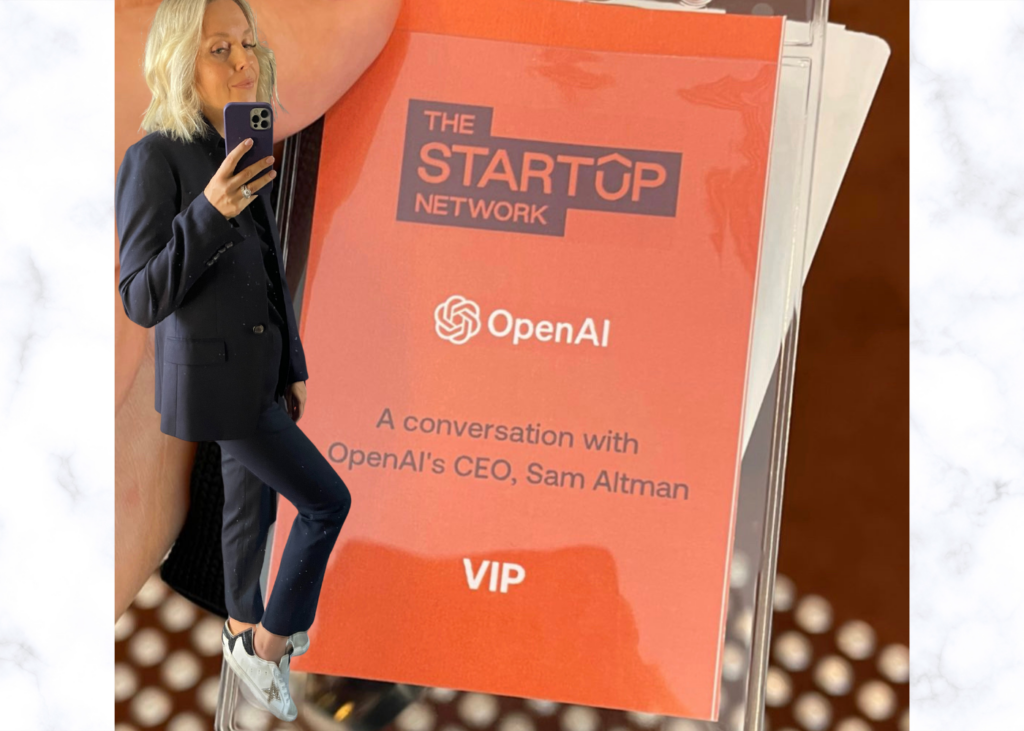
A conversation with Sam Altman: from teenage dreamer to AI visionary.
As a 15-year-old Sam Altman dreamt of inventing a new technology.
After graduating from Stanford, he launched his first tech start up, Loopt. Then at 28 he became the President of Y-Combinator, followed by an 8-day stint as CEO of Reddit. In 2015 he co-founded Open AI and is its current CEO.
On June 16, 2023, amidst an atmosphere reminiscent of a fashion show or music concert, complete with hovering personal bodyguards, Altman took the stage at the Melbourne Convention Centre, marking his only public appearance in Australia. The anticipation and buzz among the 2,000 attendees reflected the widespread recognition of his influence.
Thanks to my colleague Nic Hodges of EMT Partners and The Startup Network, I sat in the front rows just behind Altman’s OpenAI entourage.
The fireside chat was divided into two parts: first, an interview with Altman led by Dr Nora Koslowski, Melbourne Business School’s inaugural Chief Learning Officer, followed by an audience Q&A moderated by The Startup Network’s CEO, Vicki Stirling.
The aim of Altman’s tour – visiting 22 countries, 28 cities and six continents across four weeks – culminating in this fireside chat was to gain an understanding of AI’s global impact firsthand. Glossing over this superhuman effort, he described it as a “super special experience”.
Altman envisions AI as the great reset, a transformative force that will propel us into a new era of innovation and possibilities. With an emphasis on the immense potential of superintelligence, Altman shared that he was a proponent of human augmentation for scientific progress, while assuring he is not a transhumanist. He believes that we are at the starting line of a new innovation boom, highlighting the importance of AI in reshaping the world. He encouraged countries, including Australia, to adopt a global view of AI rather than a country specific one: “Think bigger; it’s more fun”.
With ChatGPT being the fastest adopted technology in human history, Altman remarked how he’s been astonished by the creative energy of the world – learning about use cases he’d never thought of as well as confirming some of the tech’s current flaws in speed latency, reasoning and that it doesn’t perform as well in languages other than English. He also shared that he thought some of the meetings would be more “boring” but had been pleasantly surprised.
In the same breath as saying that “all the rules have just changed” Altman described it as “a cool technical challenge”, noting that human to AI collaboration is easier than human to human collaboration.
When discussing the regulatory and ethical challenges surrounding AI, Altman recognised the alignment among countries on the necessity of fostering AI innovation while mitigating associated risks. He emphasised the need for novel structures that strike a balance between unleashing AI’s potential and safeguarding against unintended consequences.
Atlman did not seem blind to the dark side of AI. It’s the problem Altman (and his female co-founder, the brainchild of the tech, Mira Murati) set out to solve in starting OpenAI. Neither is he tone deaf to the complexity of the plethora of nuances involved. There was an 8-month lag between the release of GPT3 and GPT4 for that reason – testing, analysing, checking in a “fast feedback loop”. “And we still missed some things”, he admitted.
Altman flipped the “naïve” notion that AI will simply replace jobs. Instead, he believes that AI will elevate human capabilities, enabling individuals to meet increasingly higher expectations. While certain roles may evolve or become obsolete, Altman asserted that human demand is limitless. In his mind, human doctors won’t be replaced but the day to day experience of being a doctor will change. He relayed the importance of cultivating creativity, resilience, flexibility, and adaptability, along with a deep understanding of human desires, as necessary skills to master in the AI age. Altman predicted that the pace of change is going to dramatically.
Given the predominant tech bro vibe at the event, it was pleasing to hear that ChatGPT was inspiring more females to pursue careers in tech and AI, and diversity and inclusion efforts more broadly.
From a 15-year-old dreamer to a globally influential AI visionary, in just an hour one gets the sense that Altman is pretty exceptional, and open minded.
And I get the feeling that in all his deeply intelligent yet casual demeanour – saying “cool” and “like” a lot, his visionary soul remains acutely aware of the weight and unpredictability of OpenAI’s legacy propelling society into a future where technological advancements shape human existence.
But first, Altman said that he needs to type out his handwritten notes from the trip on the plane ride home.
……………………………………………………………………………………………………………………………………………………………..
Thanks for reading my post.
I’m on a mission to help law and business adapt to the digital age. I invite you to build your Innovation Intelligence (what I call IQ2.0) with me:
@legallyinnovative | annalozynski.com | Anna Lozynski – LinkedIn | inCite Legal Tech